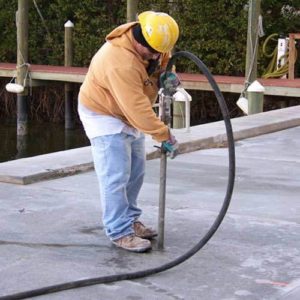Prominent & Leading Service Provider from Delhi, we offer Injection Grouting Services.
Since we have established our base in this industry, we are highly known for offering a high quality service of Injection Grouting. These offered services are demanded in construction industries owing to their wide uses. We are offering these services after stringently examining them on all the quality factors set by the domestic industry. Apart from this, we are providing these services in customized requirement within the given time frame. Technova Waterproofing Pvt. Ltd.
Injection Grouting Types and Materials for Concrete Crack Repair :
Injection grouting is a process of filling the cracks, voids or honeycombs under pressure in concrete or masonry structural members for repairing of cracks, strengthening of damaged concrete or masonry structural members.
Grout is a flowable plastic material and should have negligible shrinkage to fill the gap or voids completely and should remain stable without cracking, de-lamination or crumbling. Technova Waterproofing Pvt. Ltd.
There are different types of grouts used for repair and strengthening of concrete and masonry structural members. The selection of type of grout for particular type of concrete or masonry repair work should be based on the compatibility of the grout with the original material. Technova Waterproofing Pvt. Ltd.
Types of Injection Grouting and Materials for Concrete Crack Repair :
Following are the various types of injection grouting and materials for concrete crack repair:
- Polymer injection grouting
- Fiber-reinforced injection grouting
- Cement – sand grouting
- Gas-forming grouting
- Sulfo-aluminate grouting
Polymer Injection Grouts:
Polymer injection grouting is based on use of polymers such as polyester, epoxy, vinyl ester, polyurethane and acrylic resins. The most popular polymer used for epoxy grout is epoxy. Polyurethane and acrylic resin based polymers are used for treatment of water retaining structure, underground structures as well as to prevent seepage of water. v
The polymer injection grouts are available in three component materials and two component materials. The three component materials grout includes:
(i) Liquid resin content
(ii) Curing agent or hardener
(iii) Aggregate or dry filler
The two component materials grouts include:
(i) Curing agent or hardener
(ii) Aggregate or dry fillers.
The polymer injection grouts are can have be made suitable for repair works by adding modifiers to basic resins and curing agents to achieve the desired properties. These vary from manufacturer to manufacturer, and therefore should always be used based on manufacturer’s recommendations.Technova Waterproofing Pvt. Ltd.
Following are properties of different types of Polymer Based Injection Grouting:
Epoxy based injection grouts possess low pot life, non-resistant to ultraviolet exposure and high temperatures, non-shrink, flowable, effective in sealing cracks, excellent bonding with almost all building materials, good chemical resistance.
Acrylic polymer based injection grouts possess improved flexural and tensile properties, resistance to cracking, segregation, improved impermeability, chemical resistance, rapid setting. Shrinkage may reduce/increase resistance to corrosion of Steel, Dynamic load/vibrations resistant.
Lignosulfonate based injection grout admixture lowers viscosity of cement slurry, compensates drying & plastic shrinkage.
2. Fiber-Reinforced Injection Grouts:
Fiber reinforced concrete is used for repair of concrete and masonry structural members. Fibers such as polypropylene, Steel or Glass fibers are used with Portland cement or shrinkage compensating mortar to repair and strengthening of structural members to provide improved flexural strength, impact resistance and ductility. Fiber reinforced injection grouts require skilled handling to avoid segregation of fibers.
3. Cement – Sand Grouts:
Technova Waterproofing Pvt. Ltd. Cement-sand grout is the most popular type of grout used for repair of concrete or masonry structure and is easily available. This grout is used for the places where strength enhancement of structure is not required. This is also most popular because it is readily available in the market and is cheapest form of repair of concrete and masonry structural members.
This method requires high water and cement contents for injection purpose. The use of cement-sand grouts results in shrinkage and cracking of grout at hardening and to minimize this, suitable shrinkage compensating agents are required. Use of cement-sand grouts is very common in masonry buildings, but not very common in concrete.
4. Gas-forming Grouts:
Technova Waterproofing Pvt. Ltd. The gas-forming injection grout is used based on the principle that the gas bubbles expand the grout to compensate shrinkage of grout after application. These gas bubbles are generated on reaction of some ingredients (usually Aluminium and Carbon powder contained in grout) with the cement liquor.
The gas bubble forming injection grouts are temperature sensitive and is not suitable for high temperature application require proper confinement to develop strength and volume stability, as the reaction forming gas bubbles may be too fast and may complete before placing of the grout.
5. Sulfo-aluminate Grouts:
Technova Waterproofing Pvt. Ltd. Sulfo-alum injection grout is also based on the principle shrinkage compensation. In these grouts either shrinkage-compensating cement or anhydrous sulfo-aluminate expansive additive is used with Portland cement. The additive results, in expansion at hydration.
Technova Waterproofing Pvt. Ltd. This produces expansion after the grout has set and is more reliable than gas -forming grouts. But the expansion of such grouts requires post-hardening curing and it will not be effective if moist curing is not available.
.
Other Details
- Hassle free management
- Best price deal
- Reliable solution
- Technova Waterproofing Pvt. Ltd.
- www.technovawaterproofing.com
